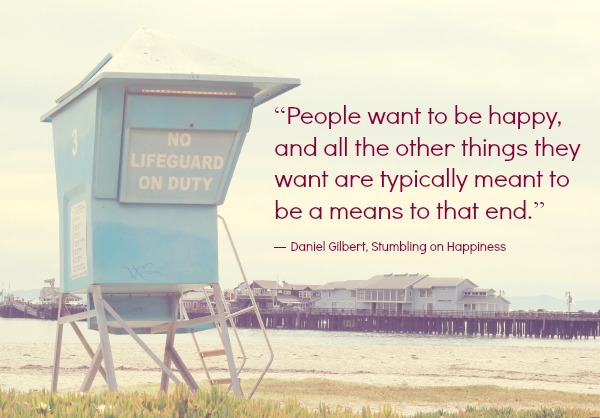Allow me to make a little recommendation on this lovely Tuesday:
If you find yourself with 75 minutes (or so) to spare, watch the documentary/movie “HAPPY”
No, I don’t benefit at all by recommending this film, but I loved it so much I couldn’t NOT tell people about it! I forget who first recommended this movie to me, but it was awesome. Of course, I’m obsessed with positive psychology and associated studies, but I think most people could get something awesome out of watching this film. It even refers to one of my all-time favorite books, Stumbling on Happiness.
The best news? You can watch it for free on Amazon’s Instant Videos (if you have a Prime account, that is) so I’m sure it’s also on Netflix.
Amazon summarizes the movie:
“HAPPY combines cutting-edge science from the new field of “positive psychology” with real-life stories of people from around the world whose lives illustrate these findings.”
… but seriously, I got so much more out of it than that.

And since I know you may not take my advice (I’m not sure why you wouldn’t, though!) and watch the video, I’m including some nuggets of wisdom I got from this short film (along with my thoughts):
- 50% of happiness is determined by range of happiness we’re born with (genetic)
- 10% of happiness is determined by circumstances (income, social status, where you live, age)
- 40% of happiness is determined by intentional activities
This means that we can control 40% of our happiness! But seriously, only 40%?! Yikes. I can’t believe that 50% is genetic… I’m in trouble for sure! (But seriously, I might be.)
- Now this part was kind of technical, but evidently dopamine is a neurotransmitter that helps control the brain’s reward and pleasure centers. If we don’t use these neurotransmitters, they start dying off (at a faster rate) after our teenage years. Physical activity is one of the best releases of dopamine.
Yet another reason to exercise!! (As if you needed any more reasons to get to the gym).
- Daniel Gilbert, the author of Stumbling on Happiness (READ THIS BOOK
) shares his research that people generally overestimate how much impact both good and bad events will have on them in future. It turns out, humans are great at dealing with bad events, and both joy and devastation quickly disappears.
Isn’t this concept life changing?! (OK, maybe it’s just me). But think about it! We spend our money and go through so much anxiety because we want specific things to happen thinking they’ll bring us great joy – but really, the joy these events/things bring does not last as long as we predict it will. The same goes for the anxiety and money we spend to avoid bad things happening. I know that I let anxiety ruin some great moments because I’m concerned about what might happen later. It’s almost like we protect ourselves from experiencing too much joy by thinking about how that joy could be taken away. However, studies will tell us that when bad things do happen, we recover quickly. Yes, some things are absolutely devastating, but that devastation fades with time more quickly than we would think.
- There are both extrinsic goals and intrinsic goals.
- Extrinsic goals = goal of getting stuff (financial success, image, status) – People who focused on these felt less satisfied and more anxious
- Intrinsic goals = inherently satisfying (personal growth, relationships, desire to help)
So make sure you have intrinsic goals!
- Happy people have a close group of family and friends
This seems obvious but it’s worth repeating, relationships and community are important!

- Japan is the least happy of the wealthy industrialized nations, supposedly because they emphasize economic growth and material prosperity above all else. These achievements came at a price – people are working long hours with a ton of stress and are literally working themselves to death.
- Denmark is consistently ranked as one of the happiest countries on Earth – this is thought to be because of the sense of community in this nation and the benefits that come with this, such as free college and free healthcare for life.
I can’t believe that people in Japan are literally working themselves to death (there’s even a word for it in the Japanese language!) but it seems like that could happen in America, too, given all the long hours that we consistently put in at the office. It turns out (obviously) more work DOES NOT lead to more happiness. And more wealth also does not lead to more happiness. Evidently there’s a huge increase in happiness up to the $50,000 salary mark (for a family) but after that, there’s not really a dramatic increase. Which (to me) means that there is no real benefit of working more and more, regardless of what society would like us to believe.
- We all need something bigger than ourselves to care about (this could be feelings of compassion that link humans together, not necessarily religion).
- We should ask ourselves, ‘What do I have that I can share?’
- Contrary to what people may believe, not all religious people are happy and not all religions are happy (fundamentalists tend to be less happy).
Isn’t it inspiring that as humans we were created to cooperate and share with each other? Cooperation actually triggers dopamine! We were made to share our gifts and talents with other people. By sharing ourselves with others, we’re actually increasing our own happiness which in turn will increase our productivity, ability to function, and even our longevity.
How’s that for some inspiration?!
I hope I haven’t bored you with so many facts, but I just love the ‘reality check’ of what really makes a person happy vs what society tells us will make us happy.
So go out there, build relationships, give your time and talents to others, and set goals about who you want to be instead of what you want to obtain.
Cheers to infinite possibilities and lives full of happiness,
















